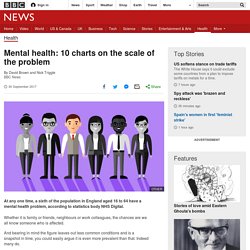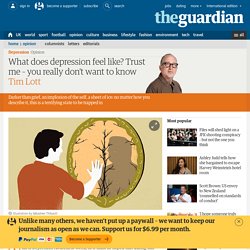

Every life lost to suicide is a tragedy. Shout – for support in a crisis. Our mental health is fracturing. Here’s what I wish I’d done... We are fighting the wrong war.

People are suffering from mental distress on a scale perhaps never seen before. They wait months for cursory medical intervention, and have to travel hundreds of miles for a rare inpatient bed. In response, all government does is promise something it can’t and won’t deliver: parity of esteem. Our mental health is fracturing, here and now. It’s a public health emergency – the numbers are off the charts. That said, we will definitely lose this struggle if we just see it in terms of beds and billions of pounds. There is no shortage of daily advice for enhancing physical health. The woman challenging mental health stigma with her Out Of Office - BBC Three. Mental health: 10 charts on the scale of the problem.
Image copyright Other At any one time, a sixth of the population in England aged 16 to 64 have a mental health problem, according to statistics body NHS Digital.

Whether it is family or friends, neighbours or work colleagues, the chances are we all know someone who is affected. And bearing in mind the figure leaves out less common conditions and is a snapshot in time, you could easily argue it is even more prevalent than that. Indeed many do. With Prime Minister Theresa May expected to announce plans to improve care next week, these 10 charts show the extent of the challenge. 1. It seems to be getting more common - or at least among those with severe symptoms. Evidence from the NHS Digital study in England shows the rise has been driven by an increase in women with illness. When Maurice Shanahan needed help with his mental health, the GAA was there. Maurice Shanahan picked up a hurling All Star a couple of weekends ago, and by revealing his struggle on the evening of the event, he hoped to encourage others to seek help, just as he did, writes Michael Moynihan The lunchtime crowd was emptying out of the Dungarvan pub when a middle-aged couple broke away to approach two big men putting away BLTs in the corner.

The couple shook hands with the two men and congratulated the younger one in particular. “And not just on the All Star, either. What you said was very important, not just for you, and not just for Waterford either. Well done.” After a few more pleasantries about Lismore’s chances of returning to the senior ranks next season, they were gone out and along the quayside, and Maurice and Dan Shanahan returned to their sandwiches. Ever since the younger of the Shanahan brothers spoke frankly and bravely about his battle with depression, such encounters have been occurring regularly.
What does depression feel like? Trust me – you really don’t want to know. This is Depression Awareness Week, so it must be hoped that during this seven-day period more people will become more aware of a condition that a minority experience, and which most others grasp only remotely – confusing it with more familiar feelings, such as unhappiness or misery.

This perception is to some extent shared by the medical community, which can’t quite make its mind up whether depression is a physical “illness”, rooted in neurochemistry, or a negative habit of thought that can be addressed by talking or behavioural therapies. I’m not concerned about which of these two models is the more accurate. I’m still not sure myself. My primary task here is to try to explain something that remains so little understood as an experience – despite the endless books and articles on the subject. Because if the outsider cannot really conceptualise serious depression, the 97.5% who do not suffer from it will be unable to really sympathise, address it or take it seriously. How not to talk to someone with depression.
Being depressed is really not enjoyable.

Depression takes many forms for many different people – some people have highs and lows, some have major depression, some have functional days and others never do. Depression can involve a huge array of treatments including therapy, medication and experimental modalities. Jack Green: GB hurdler on depression & the American dream. By Tom Reynolds BBC Sport "I am a runner.

I have depression. I still believe I can be the best in the world. " Jack Green has never wanted for talent or self-belief. But in the last 18 months, the Great Britain 400m hurdler has discovered his unique sporting prowess is both a gift and a curse. Depression - Coping with Depression. Mental Health: It's Time To Talk. Mental Health Medication - Headmeds. Teenage depression - Family Lives. If your teenager is showing signs of depression, you may find yourself wondering whether it's 'just a phase' or something more serious.

On average, three young people in every classroom are affected by mental health problems like depression. Many go undiagnosed and never get the help they need. Mental health problems cause more early deaths than either heart disease or cancer. Many teenagers are particularly vulnerable to depression, caused by the huge number of biological and social changes going on in their life, along with other factors like money worries and family breakdown.